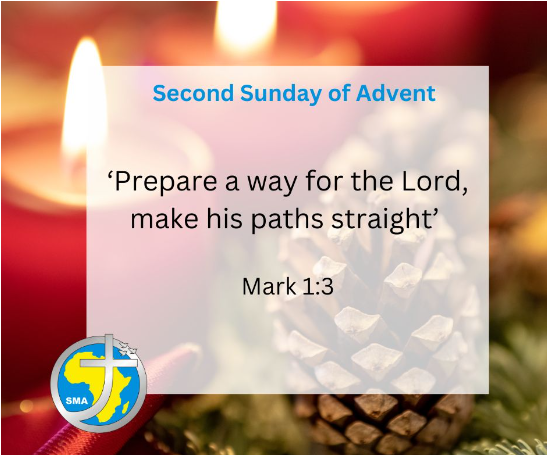Readings: Isaiah 40:1-5,9-11; 2 Peter 3:8-14; Mark 1:1-8
Theme: Prepare a way for the Lord, make his paths straight’ (Mark 1:3)
The note of joyful hope, rather than penance, dominates the season of Advent, as our first reading today shows: ‘Go up on a high mountain, joyful messenger of Zion. Shout with a loud voice, joyful messenger to Jerusalem. Shout without fear; say to the towns of Judah, “Here is your God”’ (Is 40:9). This was the good news that the prophet Isaiah brought to the crushed and dispirited exiles of Israel in the sixth century before Christ. He was telling them that their God had come to liberate them and bring them home. This is surely a message that must resonate with the many oppressed and ravaged people of our world today. We cannot help but think especially of the war-torn people of Ukraine and Gaza! How they must long for ‘the messenger who announces peace, who brings good news, who announces salvation’ (Is 52:7)
Our gospel reading opens with the proclamation of the ‘Good News about Jesus Christ, the Son of God’ (Mk 1:1), in whom Isaiah’s hope is fulfilled. In introducing his gospel, Mark highlights the role of John the Baptist in preparing the way for Christ. He presents him as the messenger foretold by Isaiah, the ‘voice that cries in the wilderness: prepare a way for the Lord, make his paths straight’ (Mk 1:3). From Jerusalem and the surrounding region of Judea large crowds of people travelled to the banks of the river Jordan to hear John. These were people who had been, for a very long time, on the lookout for a sign of hope, for some indication that a fresh start was possible in their lives. John baptises them in the waters of the Jordan and summons them to repent and prepare a path in the desert for the one who comes after him, the one who will will baptise them with the Holy Spirit (cf. Mk 1:8). John’s baptism marks a new beginning for them, a time for them to turn away from sin and strive again to be faithful to God.
The desert John is referring to is not just a physical desert; it is a symbol for the desert of the world and of our hearts. And making a pathway in the desert indicates the work we need to do as we prepare to welcome Christ this Christmas and await his second coming: filling in the valleys of misery and injustice; razing to the ground the hills of stubbornness and pride; making straight the twisted paths of corruption and lies; and clothing ourselves with humility, integrity and holiness – tasks that this special season of grace summons us to undertake with a renewed sense of purpose. Our second reading today, from Saint Peter, reminds us of the vision that informs this sense of purpose and the kind of lives that reflect it: ‘What we are waiting for is what he promised; the new heavens and new earth, the place where righteousness will be at home. So, then, my friends, while you are waiting, to you best to live lives without spot or stain so that he will find you at peace’ (2 Peter 3:14).
Our readings today challenge us to examine our lives in the light God’s promise to make all things new in Christ. and be willing to change what needs to be put right. There are surely areas in our lives that have yet to be touched by the healing power of God’s forgiveness, regions of our heart where the word of God has not penetrated. Advent offers us the graced opportunity to open up our hearts and allow God to remold us and make us new. Sometimes, we may think we don’t need to change, or to be changed. We can convince ourselves that we’re ok as we are. More than our sins, our complacency may be the greatest obstacle to God’s working in us. This is illustrated by a story in Luke’s gospel about Jesus’ visit to the home of a rich Pharisee, named Simon (cf. Luke 7:36-50). Simon learns nothing from Jesus’ moving encounter with the sinful woman who showed her love for him by washing his feet with her tears and drying them with her hair. He simply disapproves of Jesus’ conduct. Simon’s attitude his well illustrated by the following Zen story:
A Zen master invited a visitor to tea. The guest arrived, crossed his legs and sat in silence. The Zen Master then took the teapot and started to fill the cup. When he had filled it to the brim, he continued to pour until the tea was flowing over the saucer and on to the floor. The guest was horrified and enquired why the Zen master was so careless. ‘Because’, the master replied, I feel that your head is like this teacup – so full of certainty that it would be impossible for me to add anything to what you already know. You cannot hear what I say.’
It’s going to be very hard for God to find a chink in our armour, if we are as complacent and closed as the Zen Master’s guest. So in the words of the Monaghan poet, Patrick Kavanagh, ‘Let us lie down again/Deep in anonymous humility’ And God may find us worthy material for his hand’ (Having Confessed).
I will conclude with an Advent prayer: ‘Clear a pathway, Lord, in our hearts to make them ready for your only Son, so that when he comes we may serve you in sincerity of heart. Amen’
Fr Michael McCabe SMA
To listen to an alternative Homily for this Sunday, from Fr Tom Casey of the SMA Media Centre, Ndola, Zambia please click on the play button below.
|
|

